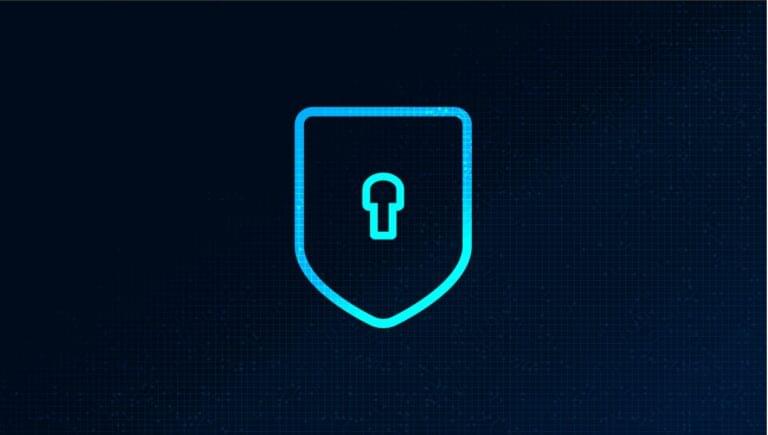Why Developers Should Use a VPN
Everyone can benefit from a VPN, but they’re particularly suitable for developers because you spend a great deal of time online and frequently work with sensitive data. Here are ten ways using one will give you peace of mind:- It’s an effective way to protect your intellectual property, including proprietary code, custom designs and frameworks, apps, and resources from being stolen and used or sold by hackers.
- It limits the risk of any client data you’re hosting being compromised, including their financial data, contact information, schematics, patents, and more.
- It helps prevent data leaks of new product announcements, advertising campaigns, acquisitions, and more.
- You can research your competitors’ websites and products discreetly using a different IP address, so they don’t know you visited.
- You can check that your applications and websites work correctly internationally by connecting to servers in other countries. For example, you can check that your site isn’t slow, confirm that the local language and currencies have been correctly identified, and see if any of your resources have been geo-blocked.
- You can ensure that remote team members can access all of the necessary resources and references essential to web development. For example, YouTube tutorials for new tools and technologies may not be accessible from all countries without a VPN.
- When working outside of the office, you can connect to public Wi-Fi hotspots with confidence.
- Hackers can’t use network traffic to learn the login details to your server when you or remote workers access it outside of the office. It also prevents them from intercepting the data you’re retrieving.
- Many VPN services have anti-malware software built-in, which will protect you and your team from phishing attacks and other threats.
- It improves your overall online privacy and security. That’s always a good thing.
What You Need from a VPN
Here are some things to look for when choosing a VPN. We’ll consider these to be qualifying features in our search for the best VPN for developers.Good Connection Speed
Encrypting your traffic and passing it through a server takes time. So expect to see a decrease in your upload and download speeds. How much it decreases depends on several factors, including the distance the server is from you, the number of other users currently connected, and the quality of the hardware. In addition, I’ve encountered widely varying speeds between the different providers, and some offer fairly consistent rates from server to server while others don’t. These factors make interpreting speed tests difficult. Connecting to a server from one part of the world will be different than connecting to it from another. When you encounter slow speeds, it’s difficult to determine whether the VPN is slow, the server is under an unusual load, or your ISP is having a bad day. I’ve performed speed tests on multiple servers of numerous VPN services over the years. Here’s a comparison of the maximum speed achieved with each VPN as a percentage of my usual, unprotected speed:- CyberGhost: 91%
- ProtonVPN (free): 76%
- Surfshark: 73%
- NordVPN: 70%
- ExpressVPN: 56%
- TorGuard: 49%
- PureVPN: 48%
- IPVanish: 41%
- Private Internet Access: 38%
A Large Number of Servers Around the World
VPNs often provide thousands or tens of thousands of servers around the world. More servers help distribute the load and provide access to content in other countries.- CyberGhost: 6,900 in 60+ countries
- PureVPN: 6,500+ in 140+ countries
- NordVPN: 5,500 in 59 countries
- Private Internet Access: 3,252 in 37 locations
- Surfshark: 3,200+ in 65 countries
- ExpressVPN: 3,000+ in 94 countries
- TorGuard: 3,000 in 50 countries
- IPVanish: 1,600+ in 60 countries
- ProtonVPN: 1,237 in 55 countries
Privacy Policies and Features
All of your traffic goes through the VPN, so what the company does with that data is essential. Many have a “no logs” policy and claim not to keep any record of your activities. Unfortunately, “no logs” doesn’t always mean no logs. If your plan has device or bandwidth restrictions, they need to keep some records to ensure you’re not going over. Typically, these logs are deleted periodically, typically after 24 hours or 20 subsequent connections. PureVPN and IPVanish have significant privacy failures in their history: both companies have provided information in court cases that they claimed not to log. Fortunately, some providers are particularly strict about keeping no logs, and court cases have proven their policies. For example, Restore Privacy reports that in December 2017, police in Turkey attempted to force ExpressVPN to provide customer data for a criminal investigation. However, ExpressVPN did not have any logs to give authorities. PureVPN and PIA have similar stories. Also, some companies are audited by third parties regularly to verify the no logs claim, including ExpressVPN, NordVPN, Surfshark, and PureVPN. Some, such as ExpressVPN and Surfshark, go as far as having RAM-only servers. Once they are switched off or rebooted, no data at all is retained. inVPN.com has an interesting article exploring this, and expect to see more VPN services follow suit in the future. Most VPN services store personal information about you for account-keeping purposes, while others require just an email address and are happy for you to use a temporary one. Bank transactions are another way to connect you to a specific VPN account, and privacy-conscious services allow you to pay anonymously, such as with cryptocurrency or gift vouchers. In this review, only PureVPN and IPVanish offer no form of anonymous payment. You should also note where the service is based because some countries require companies to retain certain records. For example, the US Patriot Act allows the FBI to obtain personal information without a judge’s approval, and some countries have intelligence-sharing agreements with the US. Nevertheless, court cases have tested the privacy policies of some US-based VPNs, where it was verified they were not keeping any logs. Finally, some services offer features like Double VPN and TOR over VPN. These significantly increase your anonymity, but usually at the expense of performance. Of course, you rarely need this level of anonymity, but here are some services that offer additional privacy:- NordVPN: double VPN
- ExpressVPN: TOR over VPN
- Surfshark: double VPN, TOR over VPN
- TorGuard: stealth proxy
- ProtonVPN: Secure Core VPN, TOR over VPN
Security Features
Several encryption protocols are available to VPNs, and ideally, you’ll have a choice. Some offer the most robust encryption, while others provide faster speeds.- PPTP has been around for decades. It’s fast and widely supported but has significant security issues.
- L2TP and IPSec are two protocols (one for tunneling, the other for encryption) that are faster and widely used. However, they’re easily blocked by firewalls, such as those used by Netflix.
- OpenVPN is open source and very secure. It’s slower but fast enough for everyday use.
- SSTP is a fast and well-supported protocol developed by Microsoft.
- IKEv2 is a fast tunneling protocol developed by Microsoft and Cisco that is commonly paired with IPSec. It’s used on mobile devices.
- Wireguard is a new protocol that’s around twice as fast as OpenVPN but has some privacy concerns. As a result, it’s not yet available on all VPN services.
Access to Streaming Media
Netflix and many other streaming services attempt to block traffic from VPNs. That’s because media licenses often offer exclusive distribution rights to shows in certain countries, so Netflix may not have the right to offer a movie or show to residents of that country. Whether you’re actively trying to stream media from other countries or just want to watch a local Netflix show once you finish work, it’s frustrating if you have to disconnect from your VPN to gain access. Some VPN services have an extremely high success rate at bypassing Netflix’s firewall, while other services rarely seem to get through. Here’s the success rate I had when testing each service:- Surfshark: 100% (9 out of 9 servers tested)
- NordVPN: 100% (9 out of 9 servers tested)
- PureVPN: 100% (9 out of 9 servers tested)
- ProtonVPN: 100% (3 out of 3 free servers tested)
- TorGuard: 100% with a US streaming IP, 19% with other servers (3 out of 16)
- CyberGhost: 80% (12 out of 15 servers tested)
- ExpressVPN: 33% (4 out of 12 servers tested)
- IPVanish: 33% (3 out of 9 servers tested)
- Private Internet Access: 22% (2 out of 9 servers tested)
Be Aware of the Limitations
Some VPN plans have built-in limits. Make sure these aren’t too restrictive for your needs. For example, many services limit the number of devices that can connect to the VPN simultaneously:- Surfshark: unlimited
- IPVanish: unlimited
- PureVPN: 10 devices
- Private Internet Access: 10 devices
- TorGuard: 8 devices
- CyberGhost: 7 devices
- NordVPN: 6 devices
- ExpressVPN: 5 devices
- ProtonVPN: 1, 2, 5, or 10 devices depending on your plan
Price
VPNs are subscription services, and if you pay by the month, they can be a little expensive. However, many offer massive discounts if you pay for a year or more in advance, and once you decide to use a VPN long-term, this makes a lot of sense. Here are the equivalent monthly prices when paying for the cheapest plan for each service (usually a year or more in advance):- Surfshark: $2.49/month
- Private Internet Access: $2.69/month
- CyberGhost: $2.75/month
- PureVPN: $3.33/month
- NordVPN: $3.71/month
- TorGuard: $3.89/month
- ProtonVPN: $6.63/month (limited free and $3.29/month plans are also available)
- IPVanish: $7.50/month
- ExpressVPN: $8.32/month
How I Tested for the Best VPNs for Developers
I’ve personally tested dozens of VPN services over the last few years. I performed speed tests on multiple servers, attempted to access streaming media from various countries, and explored the features of each app. I also consulted comparative testing by other reviewers. That’s especially helpful when comparing the download speeds that others encountered when using the services from other countries. Here are some reviews with test results I found useful:- VPN Report 2020 by AV Comparatives, published April 2020
- VPN Comparative Test (PDF) by AVTest, published September 2020
- The Best VPN Services for 2021 by PCMag Australia, published March 2021
- The best VPN services tested for speed, reliability and privacy by Wired UK, published March 2021
- Fastest VPNs of 2021 by CNET, published March 2021
- 8 Best VPNs in 2021 for PC, Mac, & Phone by vpnMentor, updated April 2021
- CyberGhost: 4.8 stars based on 12,043 reviews
- PureVPN: 4.7 stars based on 12,091 reviews
- IPVanish: 4.7 stars based on 6,860 reviews
- ExpressVPN: 4.6 stars based on 7,040 reviews
- TorGuard: 4.5 stars based on 795 reviews
- Surfshark: 4.3 stars based on 8,212 reviews
- NordVPN: 4.2 stars based on 5,567 reviews
- Private Internet Access: 4.0 stars based on 6,633 reviews
- ProtonVPN: 3.5 stars based on 88 reviews
The Best VPNs for Developers Compared
NordVPN
NordVPN offers an excellent all-around experience. It’s fast and secure, easy to use, has a good privacy policy, and offers additional security features. It’s also affordable and reliably connects to streaming media. However, I found server speeds to be inconsistent.- Consumer rating: 4.2 stars based on 5,567 reviews (Trustpilot)
- Servers: 5,500 in 59 countries
- Simultaneous devices: 6
- Platforms: Windows, macOS, Linux, Android, Android TV, iOS, browser extensions for Firefox and Chrome
- Protocols: OpenVPN, IKEv2/IPSec, SSTP, L2TP, WireGuard
- Privacy: no logs, cryptocurrency payments
- Security: kill switch, double VPN, malware blocker
- Cheapest plan: $89 for two years (equivalent to $3.71/month)
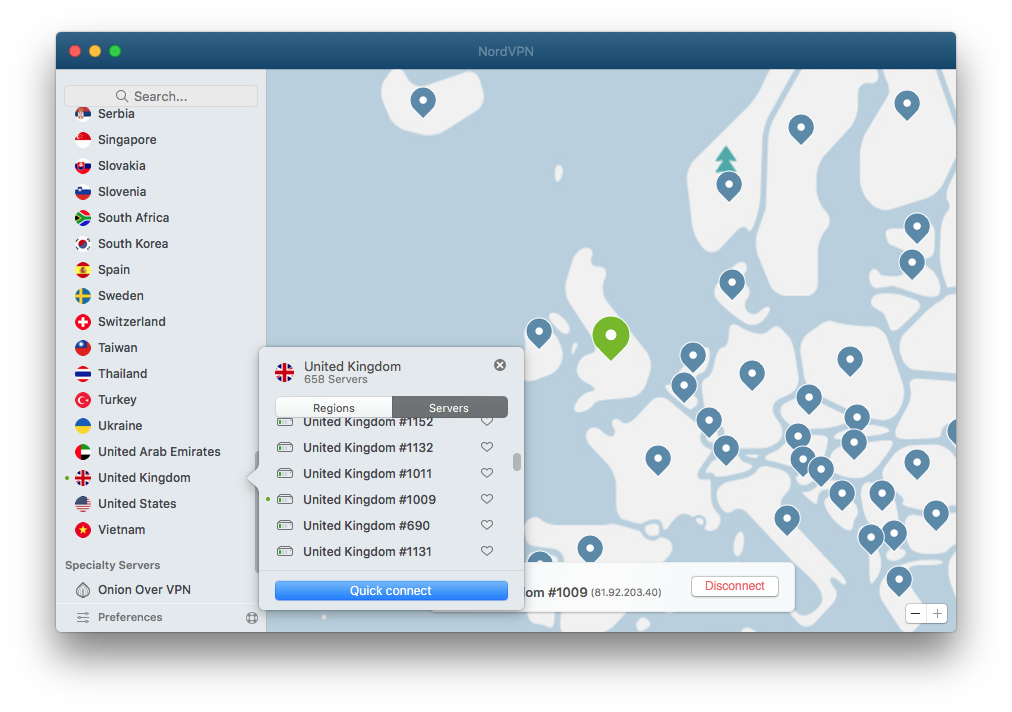 Speed: The closest Nord server to me achieved an excellent download speed of 70.22 Mbps on my 100 Mbps connection, one of the fastest I encountered. However, the average rate across all 27 servers I tested was just 25.16 Mbps, so not all servers were fast. Some other reviewers recorded slower times than I did.
Speed tests:
Speed: The closest Nord server to me achieved an excellent download speed of 70.22 Mbps on my 100 Mbps connection, one of the fastest I encountered. However, the average rate across all 27 servers I tested was just 25.16 Mbps, so not all servers were fast. Some other reviewers recorded slower times than I did.
Speed tests:
- My tests AU: maximum 70%, fastest AU, slowest UK
- PCMag AU: maximum 71.3%
- CNET US: maximum 47%, fastest Singapore, slowest the US
- AV Comparatives: average 40%
- AV-Test US: average 11% in the US, average 5% in EU
- Wired UK: 363.2 Mbps (UK), 268 Mbps (NL), 24.88 Mbps (US)
ExpressVPN
ExpressVPN isn’t as fast as NordVPN nor as successful at connecting to streaming media services. However, it’s one of the most highly respected VPNs when it comes to privacy.- Consumer rating: 4.6 stars based on 7,040 reviews (Trustpilot)
- Servers: 3,000+ in 94 countries
- Simultaneous devices: 5
- Platforms: Windows, macOS, Linux, Android, iOS, Apple TV, Roku, FireOS, Chromecast, Chromebook, extensions for Chrome, Firefox, and Edge
- Protocols: OpenVPN, PPTP, SSTP, L2TP/IPSec, Lightway
- Privacy: no logs, bitcoin payments, TOR over VPN
- Security: kill switch, RAM-only servers
- Cheapest plan: $99.95/year (equivalent to $8.32/month)
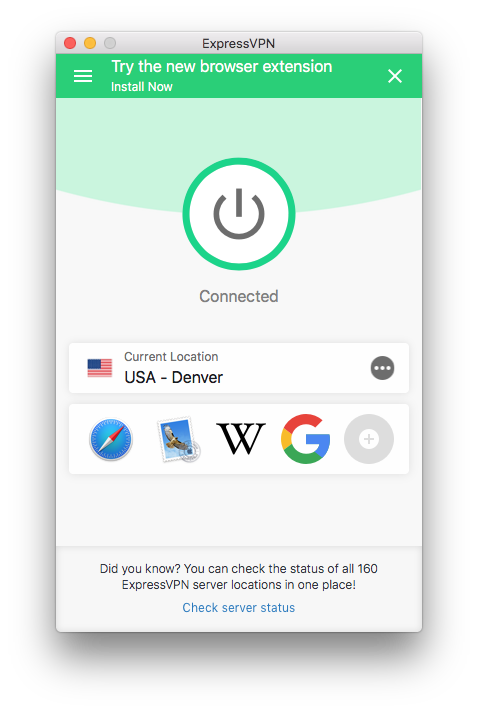 Speed: ExpressVPN has a reputation for being a faster VPN service, but speed tests do not bear that out. The explanation seems to be that it used to be faster. CNET’s 2019 speed test was a huge 98% of unprotected speed, while now it’s around half that.
Speed tests:
Speed: ExpressVPN has a reputation for being a faster VPN service, but speed tests do not bear that out. The explanation seems to be that it used to be faster. CNET’s 2019 speed test was a huge 98% of unprotected speed, while now it’s around half that.
Speed tests:
- My tests AU: maximum 56%, fastest US, slowest the UK
- PCMag AU: maximum 40.2%
- CNET US: maximum 48.2%, fastest Western Europe, slowest US
- vpnMentor UK: maximum 91%, fastest UK, slowest, AU
- AV Comparatives: average 27%
- AV-Test US: average 5% in the US, average 3% in EU
- Wired UK: 131.2 Mbps (UK), 159.2 Mbps (NL), 139.2 Mbps (US)
Surfshark
Surfshark is another well-rounded VPN service, offering good speed, excellent security, and a complete feature set. It’s also highly affordable and places no limit on the number of devices you can connect.- Consumer rating: 4.3 stars based on 8,212 reviews (Trustpilot)
- Servers: 3,200+ in 65 countries
- Simultaneous devices: Unlimited
- Platforms: Windows, macOS, Linux, Android, iOS, FireTV, Chrome, and Firefox extensions
- Protocols: OpenVPN, IKEv2/IPSec, Socks5
- Privacy: no logs, cryptocurrency payments (CoinPayments, CoinGate), double VPN, TOR over VPN
- Security: kill switch, CleanWeb ad tracking blocker, RAM-only servers
- Cheapest plan: $59.76 for two years (equivalent to $2.49/month)
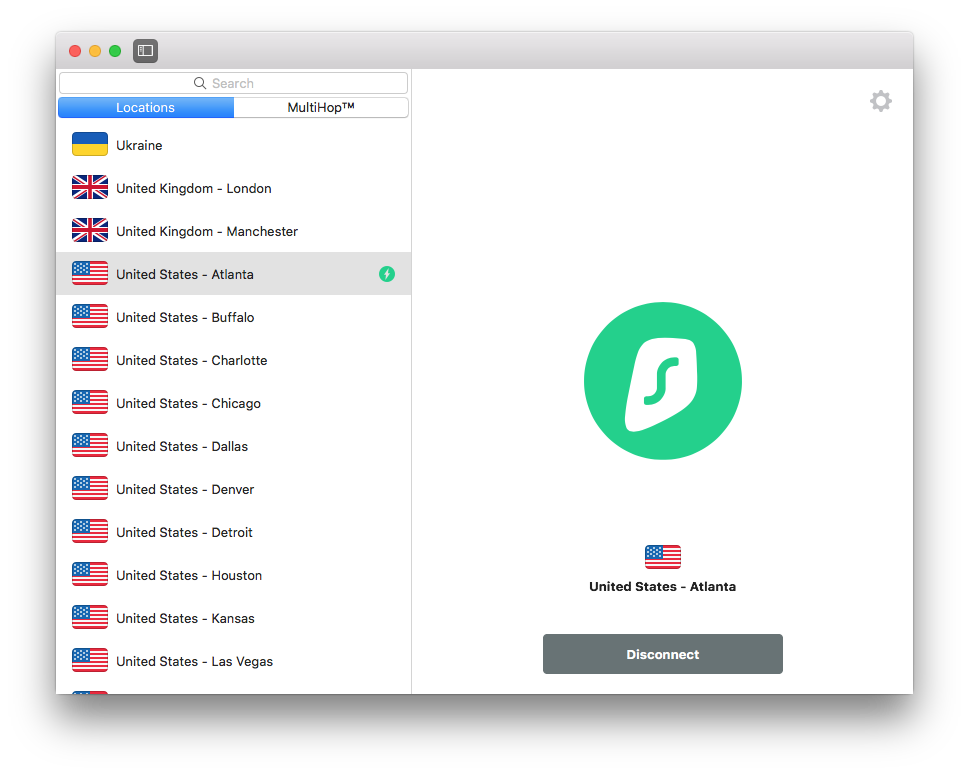 Speed: I found Surfshark’s closest server acceptably fast, achieving a download speed of 62.13 Mbps, and other reviewers had similar results. But not all of the servers are that fast. My average speed overall was just 25.16 Mbps.
Speed tests:
Speed: I found Surfshark’s closest server acceptably fast, achieving a download speed of 62.13 Mbps, and other reviewers had similar results. But not all of the servers are that fast. My average speed overall was just 25.16 Mbps.
Speed tests:
- My tests AU: maximum 73%, fastest AU, slowest US
- PCMag AU: maximum 38.4%
- CNET US: maximum 83.1%, fastest US, slowest Australia
- AV Comparatives: average 76%
- Wired UK: 236 Mbps (UK), 212 Mbps (NL), 145.6 Mbps (US)
- Camouflage mode masks your VPN activity, so your ISP doesn’t know you’re using one
- Multihop (essentially double VPN) hides your trail by jumping your connection through multiple countries
- NoBorders mode lets you use the VPN in restrictive regions
CyberGhost
CyberGhost is another affordable service that offers excellent security and privacy. According to my tests, it’s also the fastest VPN in our roundup.- Consumer rating: 4.8 stars based on 12,043 reviews (Trustpilot)
- Servers: 6,900 in 60+ countries
- Simultaneous devices: 7
- Platforms: Windows, macOS, Linux, Android, iOS, Android TV, FireTV, Apple TV, extensions for Chrome and Firefox
- Protocols: OpenVPN, IKEv2, WireGuard
- Privacy: no logs, Bitcoin payments
- Security: kill switch, ad and malware blocker
- Cheapest plan: $99 for three years (equivalent to $2.75/month)
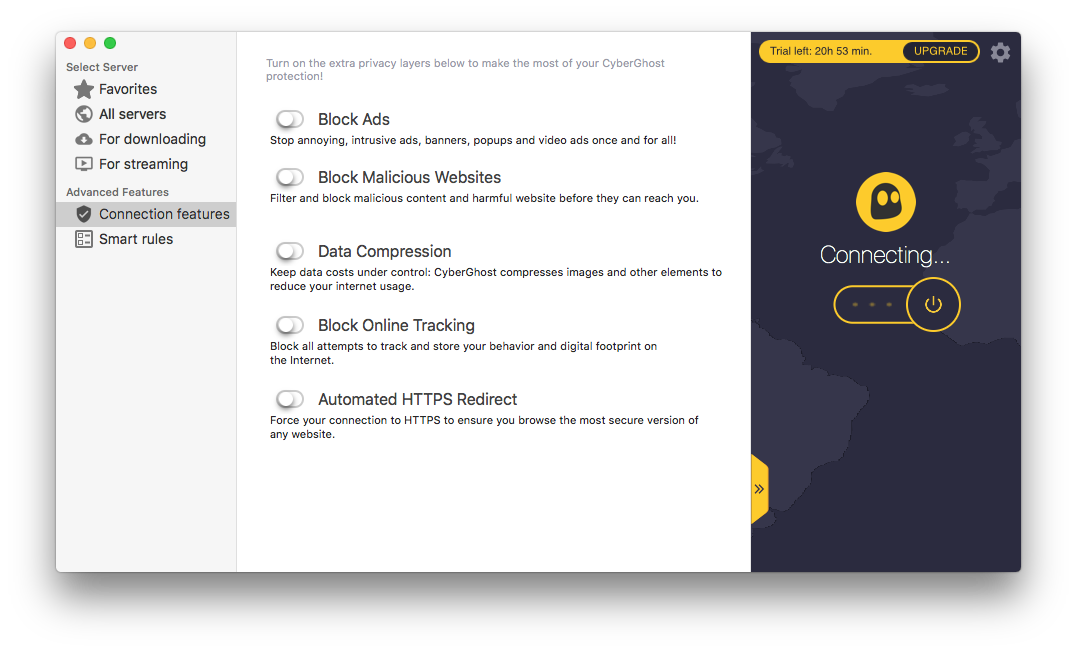 Speed: I was able to achieve the highest download speed when using CyberGhost’s closest server. It also achieved quite a high average speed, indicating fast server speeds across the board.
Speed tests:
Speed: I was able to achieve the highest download speed when using CyberGhost’s closest server. It also achieved quite a high average speed, indicating fast server speeds across the board.
Speed tests:
- My tests AU: maximum 91%, fastest AU, slowest UK
- PCMag AU: 86.7%
- vpnMentor UK: maximum 66%, fastest UK, slowest AU
- AV Comparatives: average 23%
TorGuard
TorGuard is a service that will suit tech-savvy networking gurus. All the settings are at your fingertips, so you can choose how to balance speed with security.- Consumer rating: 4.5 stars based on 795 reviews (Trustpilot)
- Servers: 3,000 in 50 countries
- Simultaneous devices: 8
- Platforms: Windows, macOS, Linux, Android, iOS, extensions for Firefox and Chrome
- Protocols: OpenVPN, WireGuard, SSTP, IPSec
- Privacy: no logs, anonymous payments (including cryptocurrencies and gift cards)
- Security: kill switch, stealth proxy
- Cheapest plan: $139.99 for three years (equivalent to $3.89/month)
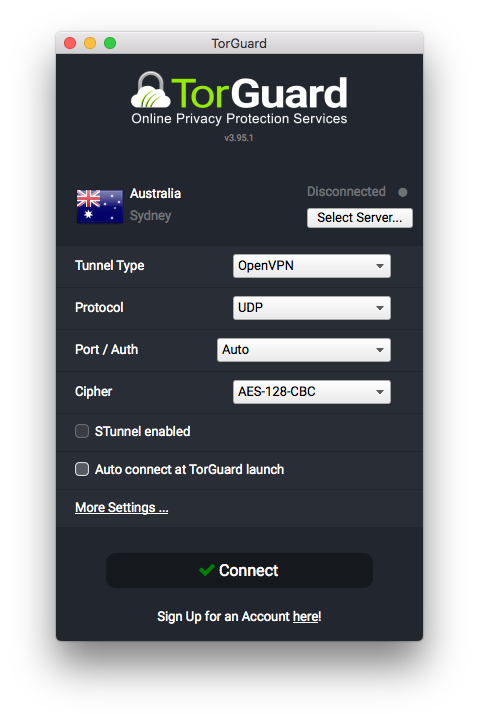 Speed: When I tested the VPN, the best speed I achieved was just half my unprotected speed, but the average speed across several servers was faster than many other VPNs I tested. Other reviewers also reported slow speeds.
Speed tests:
Speed: When I tested the VPN, the best speed I achieved was just half my unprotected speed, but the average speed across several servers was faster than many other VPNs I tested. Other reviewers also reported slow speeds.
Speed tests:
- My tests AU: maximum 49%
- AV Comparatives: average 30%
- AV-Test US: average 7% in the US, average 5% in EU
PureVPN
PureVPN seems to have made its users happy, but I have a few concerns about the service. I found its interface a little inconsistent, they don’t offer an anonymous payment method, and they don’t have the best track record with privacy. Nevertheless, there is a lot to like about the service.- Consumer rating: 4.7 stars based on 12,091 reviews (Trustpilot)
- Servers: 6,500+ in 140+ countries
- Simultaneous devices: 10
- Platforms: Windows, macOS, Linux, Android, iOS, Android TV, FireOS, Roku, Boxee, Chromecast, extensions for Chrome and Firefox
- Protocols: SSTP, PPTP, OpenVPN, L2TP, IKEv2
- Privacy: no logs
- Security: kill switch, DDoS protection, ad blocking
- Cheapest plan: $79.92 for two years (equivalent to $3.33/month)
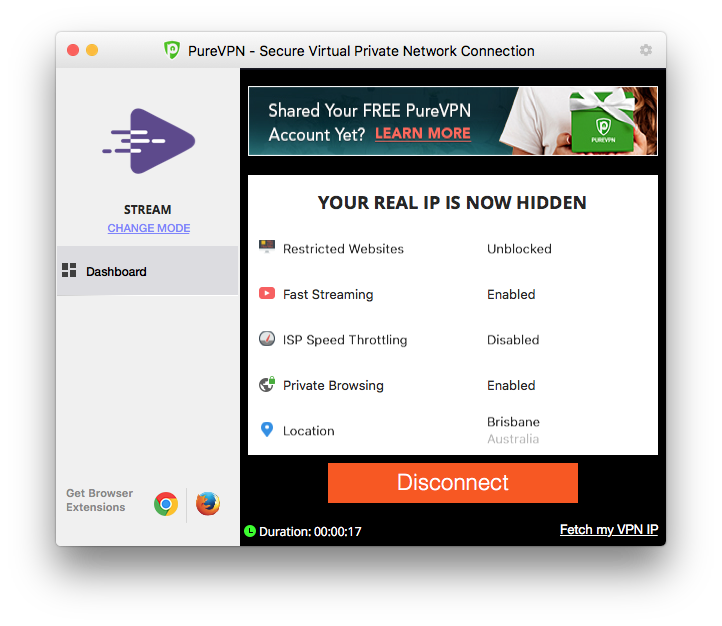 Speed: In my experience, you should expect your download speed to halve when using the VPN. Other reviewers also reported slow speeds.
Speed tests:
Speed: In my experience, you should expect your download speed to halve when using the VPN. Other reviewers also reported slow speeds.
Speed tests:
- My tests AU: maximum 48%, fastest AU, slowest UK
- AV Comparatives: average 36%
- AV-Test US: average 6% in the US, average 5% in EU
IPVanish
IPVanish is affordable, but its servers can be slow, and users can’t reliably access streaming content. Unfortunately, like PureVPN, they have a poor track record when it comes to privacy.- Consumer rating: 4.7 stars based on 6,860 reviews (Trustpilot)
- Servers: 1,600+ in 60 countries
- Simultaneous devices: Unlimited
- Platforms: Windows, macOS, Linux, Android, iOS, FireTV, Chrome OS
- Protocols: IKEv2, OpenVPN, L2TP, IPSec, PPTP
- Privacy: no logs
- Security: kill switch
- Cheapest plan: $89.99/year (equivalent to $7.50/month), first payment half price
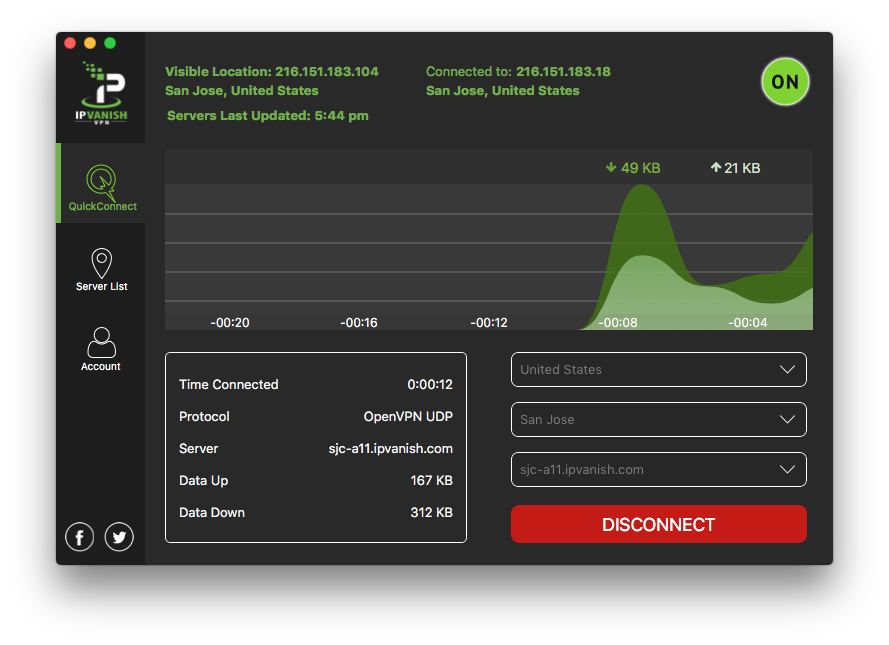 Speed: When I tested IPVanish, I encountered the slowest maximum and average speeds to date. But that’s not everyone’s experience—reviewers in the US report higher average rates than my maximum speed.
Speed tests:
Speed: When I tested IPVanish, I encountered the slowest maximum and average speeds to date. But that’s not everyone’s experience—reviewers in the US report higher average rates than my maximum speed.
Speed tests:
- My tests AU: maximum 41%, fastest AU, slowest UK
- CNET US: average 45%
- AV Comparatives: average 46%
Private Internet Access (PIA)
Private Internet Access is affordable, and its no logs policy has been verified in court. It offers an easy-to-use interface and is suited to non-technical users who are new to VPNs. Keep it in mind for your non-technical friends.- Consumer rating: 4.0 stars based on 6,633 reviews (Trustpilot)
- Servers: 3,252 in 37 locations
- Simultaneous devices: 10
- Platforms: Windows, macOS, Linux, Android, iOS
- Protocols: OpenVPN, PPTP, L2TP/IPSec, SOCKS5 Proxy
- Privacy: no logs, cryptocurrency payments
- Security: kill switch, MACE blocks domains used for ads, trackers, and malware
- Cheapest plan: $69.95 for two years with a bonus of two months (equivalent to $2.69/month)
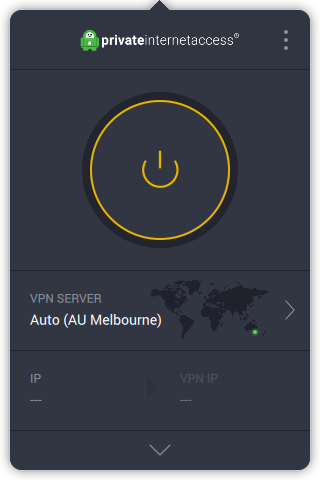 Speed: I found PIA very slow, but that’s not the whole story. Another reviewer in the UK found it extremely fast, while a US reviewer found it even slower than I did. The speed you encounter may depend on your location, but ironically, the company is based in the US, where reviewers recorded the slowest speed.
Speed tests:
Speed: I found PIA very slow, but that’s not the whole story. Another reviewer in the UK found it extremely fast, while a US reviewer found it even slower than I did. The speed you encounter may depend on your location, but ironically, the company is based in the US, where reviewers recorded the slowest speed.
Speed tests:
- My tests AU: maximum 38%
- VPNMentor UK: 98%, fastest UK, slowest AU
- AV Comparatives: average 26%
- AV-Test US: average 4% in the US, average 5% in EU
- Wired UK: 134.4 Mbps (UK), 110.4 Mbps (NL), 31.2 Mbps (US)
ProtonVPN
ProtonVPN is making waves in the privacy community as one of the better, more reliable services. They offer a host of VPN-related services and encrypted mail, online storage, and calendar. They are the only respectable company I know that offers a free tier for their VPN.- Consumer rating: 3.5 stars based on 88 reviews (Trustpilot)
- Servers: 1,237 in 55 countries
- Simultaneous devices: up to 10 depending on your plan
- Platforms: Windows, macOS, Linux, Android, iOS, Chromebook, Android TV
- Protocols: IKEv2/IPSec, OpenVPN
- Privacy: no logs, Bitcoin payments
- Security: kill switch, Always-On, Secure Core VPN, TOR over VPN, NetShield Ad
- Cheapest plan: $159 for two years for the Plus plan (equivalent to $6.63/month), and a limited free plan is available
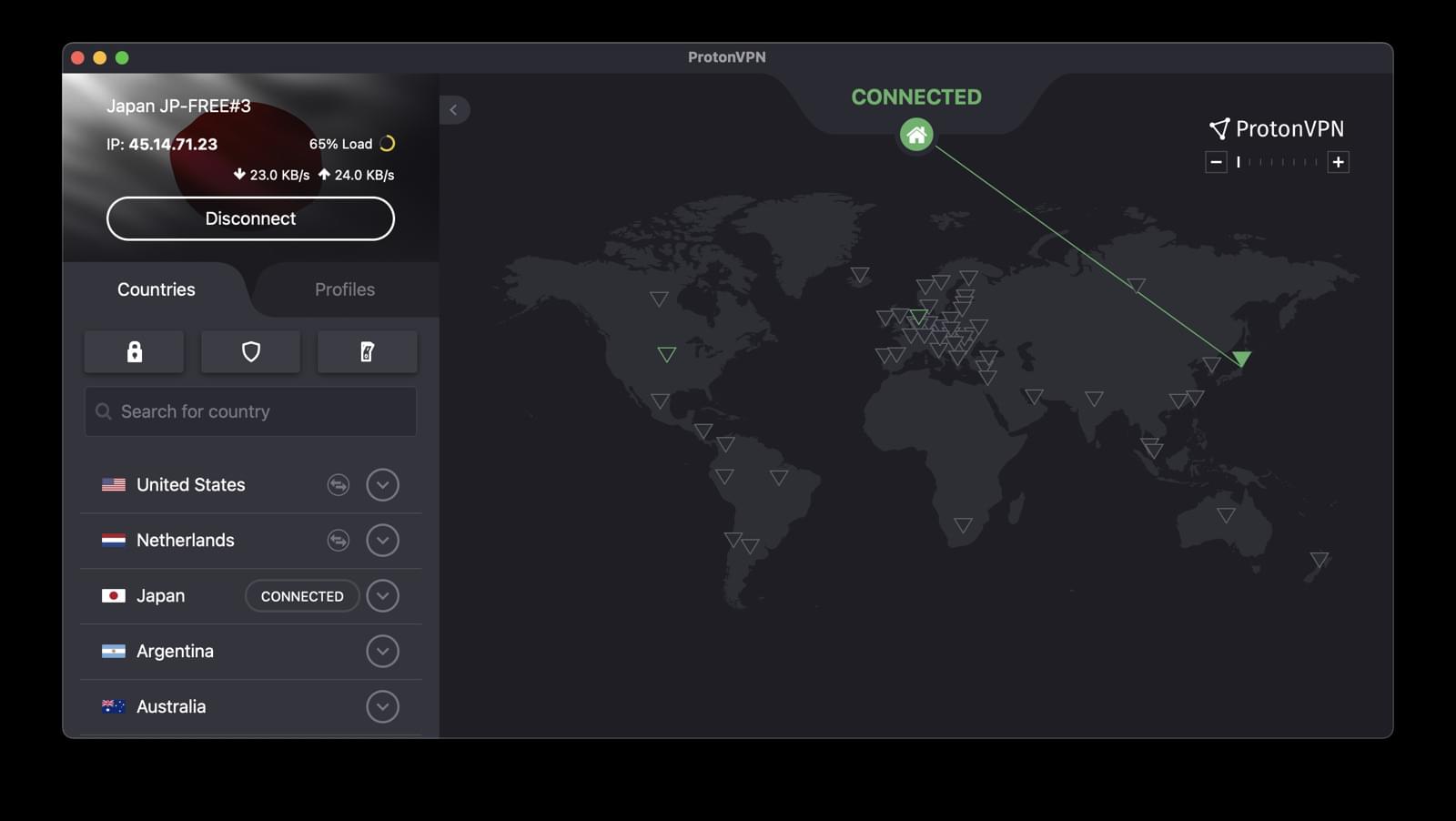 Speed: I tested ProtonVPN’s speed using the free plan and achieved an impressive 76% of my unprotected speed. Wired UK’s tests show a significant increase in paid plans, and the fact that there is no free Australian server also slowed my connection. Paying users should experience significantly faster speeds.
Speed tests:
Speed: I tested ProtonVPN’s speed using the free plan and achieved an impressive 76% of my unprotected speed. Wired UK’s tests show a significant increase in paid plans, and the fact that there is no free Australian server also slowed my connection. Paying users should experience significantly faster speeds.
Speed tests:
- My tests AU: maximum 76%, fastest JP, slowest NL
- PCMag AU: maximum 27.3%
- vpnMentor UK: maximum 75%, fastest RO, slowest BR
- AV Comparatives: average 30%
- Wired UK: 184 Mbps (the UK, paid), 164 Mbps (NL paid), 149.6 Mbps (the US, paid)
- Wired UK: 8.8 Mbps (NL free), 56.64 Mbps (US free)
The Best VPN for Developers: Which Service Should I Choose?
Every developer owes it to themselves and their clients to use a VPN service. It will help protect your valuable digital assets, enhance your security, and give unrestricted access to resources around the world. Which is best for you?- For a well-rounded solution that balances speed, security, and features, I recommend NordVPN, Surfshark, or CyberGhost.
- If you value privacy above all else, it’s hard to go past ExpressVPN. No other VPN I’m aware of is spoken of so highly.
- If you’d prefer not to spend money at this point, ProtonVPN is the only reputable company I’m aware of that offers a free tier.
Frequently Asked Questions (FAQs) about VPNs for Developers
What Makes a VPN Suitable for Developers?
A VPN suitable for developers should have features that cater to their specific needs. This includes a robust security framework to protect sensitive data, high-speed connections for efficient work, and the ability to bypass geo-restrictions. Developers often need to access resources and servers located in different parts of the world, and a good VPN should facilitate this. Additionally, a VPN that offers multiple simultaneous connections can be beneficial for developers working on various devices.
How Can a VPN Improve My Development Work?
A VPN can significantly improve your development work by providing secure and private access to the internet. It encrypts your data, preventing unauthorized access when working on sensitive projects. Additionally, a VPN allows you to test your applications or websites from different geographical locations, ensuring they work correctly for users worldwide.
Are Free VPNs Good Enough for Development Work?
While free VPNs can provide basic privacy and security, they often lack the advanced features necessary for development work. They may have slower speeds, limited server options, and weaker encryption standards. For serious development work, investing in a premium VPN service is usually a better option.
How Do I Choose the Best VPN for My Development Needs?
When choosing a VPN for development, consider factors like security features, speed, server locations, and the number of simultaneous connections allowed. Also, look for a VPN with a strict no-logs policy to ensure your online activities aren’t recorded.
Can a VPN Help Me Access Blocked Development Tools and Resources?
Yes, a VPN can help you bypass geo-restrictions and access blocked development tools and resources. By connecting to a server in a different location, you can appear as if you’re browsing from that location, allowing you to access content that’s otherwise unavailable in your region.
Does Using a VPN Affect My Internet Speed?
While a VPN can slightly slow down your internet speed due to the encryption process, a high-quality VPN service will minimize this impact. Some VPNs even offer features like split tunneling, which allows you to route only specific traffic through the VPN, maintaining faster speeds for other activities.
Is It Legal to Use a VPN for Development Work?
Yes, it’s generally legal to use a VPN for development work. However, it’s important to use it responsibly and not for any activities that violate the law or the terms of service of the platforms you’re using.
Can I Use the Same VPN for Both Personal and Development Work?
Yes, you can use the same VPN for both personal and development work. A good VPN should be versatile enough to cater to a variety of online activities, from secure browsing to accessing remote servers.
How Can a VPN Protect My Data During Development Work?
A VPN protects your data by encrypting it, making it unreadable to anyone who might intercept it. This is especially important when working on public Wi-Fi networks, where your data is more vulnerable to attacks.
Can a VPN Help Me Collaborate with Other Developers?
Yes, a VPN can facilitate collaboration by creating a secure connection between different devices. This allows you to share files and work on projects together, even if you’re in different geographical locations.
 Adrian Try
Adrian TryAdrian Try is an Aussie writer, musician, cyclist, and tech geek.
